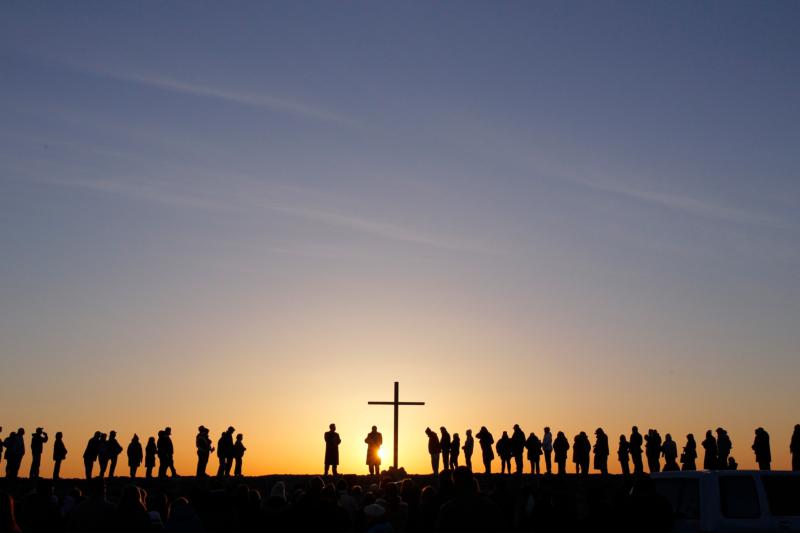
The sun rises as people gather for an ecumenical Easter service in Scituate, Mass. On Easter Sunday, we’ll hear the words in the Easter Sequence: “Christ indeed from death is risen, our new life obtaining. Have mercy, victor King, ever reigning!” (CNS photo/Jessica Rinaldi, Reuters)
Near the end of “Jesus of Nazareth,” the acclaimed 1977 miniseries, those who put Jesus to death are alarmed, to say the least, at the news his tomb has been emptied — and that maybe, just maybe, Jesus has done exactly what he said he would do: rise from the dead.
“And now,” murmurs one of the alarmed, “it begins.”
Such is Easter: a beginning. But of what?
[hotblock]
Let’s start at the empty tomb, discovered — as we see in St. John’s Gospel of Easter Sunday’s Mass during the day — first by Mary of Magdala and then by Peter, accompanied by “the other disciple whom Jesus loved” (Jn 20:2).
That disciple, says the Gospel, “saw and believed,” even though neither he nor Peter nor Mary fully understood what Scripture and Jesus himself had already proclaimed about rising from the dead.
“Living Liturgy,” Liturgical Press’ annual guide to deeper and more spiritual celebration of liturgy, notes that this episode “becomes something of a model of faith,” in which “we, like the beloved disciple, believe before we understand completely. Upon believing, we spend the rest of our lives contemplating the mystery of faith.”
That is how faith begins. “How often,” asks Living Liturgy, in its commentary on Easter Sunday, “do we say yes before completely understanding the ramifications of our assent?”
The beloved disciple, the commentary notes, likely “spent the rest of his life” pondering Jesus’ life, death and resurrection, connecting Scripture to what he had witnessed.
So, too, are we — like Jesus’ first followers — invited to contemplate and believe this mystery of all mysteries, for it is what the Catechism of the Catholic Church tells us is the center of the Christian message: that “God’s saving plan was accomplished ‘once for all’ by the redemptive death of his Son Jesus Christ” (No. 571).
Redemption for all is linked inextricably to the resurrection of Christ that we celebrate every Sunday. “The paschal mystery of Christ’s cross and resurrection,” the catechism says, “stands at the center of the good news that the apostles, and the church following them, are to proclaim to the world” (No. 571).
[tower]
By the blood Jesus shed for us, we who believe are redeemed. And our redemption is a gift greater than any we have ever received or could possibly imagine, for it comes with the promise of eternal life.
Certainly, redemption was not a gift we earned, nor anything we deserve; it was given from the love God has for each us. But it also comes with an expectation that we who are baptized are called to fulfill, something proclaimed at every Sunday liturgy.
“Through the liturgy,” notes the catechism, “Christ, our redeemer and high priest, continues the work of our redemption in, with and through his church” (No. 1069).
In other words, it is our baptismal call to serve, to live the life that Christ — through his death and resurrection — has made possible for us.
“Taken up to heaven and glorified after he had thus fully accomplished his mission, Christ dwells on earth in his church,” says the catechism (No. 669). “The redemption is the source of the authority that Christ, by virtue of the Holy Spirit, exercises over the church.”
This is especially significant to recall when we gather on Easter Sunday (and, hopefully, every Sunday throughout the year) to offer praise and thanks to God for those gifts he has given us, most especially that of his resurrected Son.
[hotblock2]
Indeed, Psalm 118, proclaimed on Easter Sunday, exhorts us to “give thanks to the Lord, for he is good” (Ps 118:1). But it also prompts us to “declare the works of the Lord” (Ps 118:17).
“The resurrection does not mean that Christ’s earthly ministry becomes a thing of the past, a phase now finished,” wrote the late Reginald H. Fuller, biblical scholar and Anglican priest, in “Preaching the Lectionary.”
“Rather, it is through the resurrection that all Christ stood for in his life … can now continue in the church. It is not the continued influence of a figure in history through his teaching and example, … but the continuation of that same word and work.”
At Easter, we are invited to recall and renew our baptism through the rite of blessing and sprinkling of water, sign of a new beginning of our life in Christ. Jesus left us with the admonition to “go and make disciples,” to live the word of God in our earthly lives — in more modern vernacular, to “pay it forward.”
If Jesus spoke against hatred and injustice, why shouldn’t we? If Jesus ministered lovingly to the poor and the lame, why shouldn’t we? If Jesus showed mercy to sinners, why shouldn’t we?
And if Jesus endured persecution and scorn for preaching a gospel of love, why shouldn’t we?
The best and most meaningful “thank you” for our redemption is by our actions, the way we live our lives — by being the presence of Christ in the world. Listen to the final words of the Easter Sequence:
“Christ indeed from death is risen, our new life obtaining. Have mercy, victor King, ever reigning!”
Amen. Alleluia!
***
Catholic journalist Mike Nelson writes from Oxnard, California.



Share this story